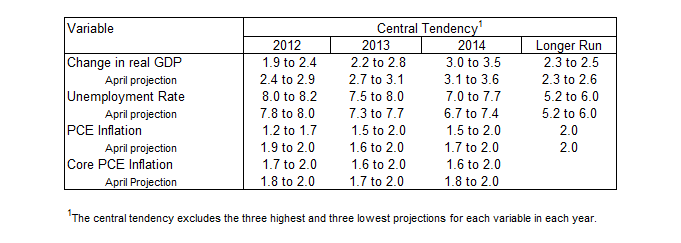As widely expected, the Fed committed to additional stimulus yesterday. The Fed will extend the size and duration of its existing "Operation Twist" program, whereby the central bank sells its short-term bond holdings and uses the proceeds to buy longer-term bonds. The Fed will have until the end of 2012 to buy an additional $267 billion in long-term Treasuries.
The goal is to bring down long-term interest rates in an effort to "make broader financial conditions more accommodative." In other words, Bernanke & Company are attempting to support a recovery in housing prices by bringing mortgage rates down even more. The Fed did not go so far as to introduce a new round of asset purchases (QE3), but it did vow to stand ready in the event that circumstances call for such action. We have no doubts that an additional program is just around the corner.
The Fed continues to press its bets. In our opinion, however, there are several problems with the strategy of Quantitative Easing.
- First, the Fed's actions have become somewhat counterproductive as the suppression of interest rates has become quite punitive for savers. Putting aside the issue of fairness, many consumers who are dependent on investment income have seen their spending power cut dramatically as a result of the Fed's actions. The aggregate reduction in spending power is undoubtedly a drag on the economy.
- Second, the Fed's aggressive purchase of long-term bonds, while keeping the Fed Funds rate at zero, has led to a flattening in the yield curve. A flat yield curve is bad for bank profitability. If banks are less profitable, they are less willing to expand the extension of credit - which is a major goal of Fed policy.
- Third, it appears that the Fed is pushing on a string at this point. It does not appear as though an incremental decrease in interest rates will improve either the supply of or demand for loans. The supply of loans is being affected by unprecedented regulatory uncertainty at the banks (in addition to the flat yield curve and economic uncertainty). Until the ambiguity with regard to capital requirements and other issues is cleared up, the flow of credit is unlikely to improve. On the demand side, consumers remain over-indebted and must go through a process of deleveraging to repair their balance sheets. Businesses, for their part, are paralyzed by uncertainty ranging from the situation in Europe to future taxes and healthcare costs. Therefore, incrementally lower interest rates are unlikely to stimulate incremental economic activity at this point.
- Fourth, the Fed's initiatives to bring down interest rates do nothing to remedy the problem of tight lending standards for many borrowers. As yesterday's Wall Street Journal article by my friend Jon Hilsenrath so aptly discussed, only those who don't need credit are able to obtain credit. Those in desperate need (who are more willing to spend or invest) are unable to find banks willing to lend. Therefore, the Fed's actions may be having the additional unintended consequence of expanding the wealth gap in the country.
- Fifth, the Fed's actions may have actually inhibited a recovery in housing as lower prices may have allowed the market to clear by now. Instead, huge numbers of properties remain in some stage of the foreclosure process. This overhang will undoubtedly drag out the process.
- Sixth, the printing of trillions of dollars by the Federal Reserve will create the risk of widespread inflation down the road some time. As we have discussed in past market commentaries, we believe the Fed must consider the risk of asset inflation as well. Have the Fed's policies created a bubble in the stock and/or bond markets?
- Seventh, the reduction in long-term interest rates is negatively affecting the funded status of pension plans, both at the corporate and government levels. As interest rates fall, companies and governments are required to set aside more money to fund these plans. This money could be put to better use elsewhere (hiring and other investments).
- And finally, aggressive monetary policy may have the effect of reducing the sense of urgency felt by politicians on the issues of the fiscal cliff and long-term structural deficits.
In a nutshell, we are trying to say that the Fed has become somewhat impotent and should pass the buck to Congress. If only Congress would answer the phone...

